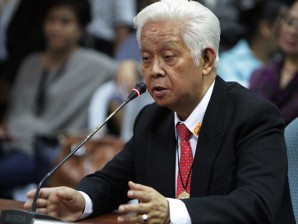Comelec scraps metal padlocks
MANILA, Philippines—The Commission on Elections (Comelec) is shifting from the use of metal padlocks to cheaper plastic seals to secure ballot boxes.
It is also doing away with ink pads as voters will only need to affix their signatures, not their thumb marks, on the voting record.
That’s how it’s going to be in the May 13 elections with an Ilocano, known for being “kuripot” (a miser), at the helm of the election body.
Comelec Chair Sixto Brillantes Jr. told reporters on Friday the commission has decided to do away with metal padlocks and thumbmarking, primarily to save more than P15 million in expenses.
But another advantage in using plastic seals is that they can’t be easily replaced in case of a breach in the ballot boxes because they have serial numbers unlike the metal padlocks that the Comelec used in the past, Brillantes said.
Article continues after this advertisement“Too bad for them, the chairman is Ilocano,” he quipped, alluding to the penny-pinching ways of natives of that region.
Article continues after this advertisementHe said that from his experience as an election lawyer, he had observed that the metal padlocks were merely “decorations” and didn’t really guarantee safety from cheaters and manipulators, apart from being more costly.
“When I was still practicing, we just flipped the padlocks with our fingers and they opened easily,” he told reporters.
According to Brillantes, it was difficult to detect if a ballot box has been tampered with because the padlocks that secured them did not bear serial numbers.
But with the plastic seal, the Comelec can prevent tampering or, if not, will at least be able to detect a breach in the ballot boxes.
MANILA, Philippines—The Commission on Elections (Comelec) is shifting from the use of metal padlocks to cheaper plastic seals to secure ballot boxes.
It is also doing away with ink pads as voters will only need to affix their signatures, not their thumb marks, on the voting record.
That’s how it’s going to be in the May 13 elections with an Ilocano, known for being “kuripot” (a miser), at the helm of the election body.
Comelec Chair Sixto Brillantes Jr. told reporters on Friday the commission has decided to do away with metal padlocks and thumbmarking, primarily to save more than P15 million in expenses.
But another advantage in using plastic seals is that they can’t be easily replaced in case of a breach in the ballot boxes because they have serial numbers unlike the metal padlocks that the Comelec used in the past, Brillantes said.
“Too bad for them, the chairman is Ilocano,” he quipped, alluding to the penny-pinching ways of natives of that region.
He said that from his experience as an election lawyer, he had observed that the metal padlocks were merely “decorations” and didn’t really guarantee safety from cheaters and manipulators, apart from being more costly.
“When I was still practicing, we just flipped the padlocks with our fingers and they opened easily,” he told reporters.
According to Brillantes, it was difficult to detect if a ballot box has been tampered with because the padlocks that secured them did not bear serial numbers.
But with the plastic seal, the Comelec can prevent tampering or, if not, will at least be able to detect a breach in the ballot boxes.
